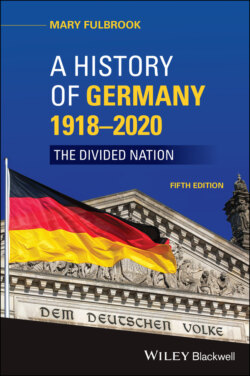A History of Germany 1918 - 2020

Реклама. ООО «ЛитРес», ИНН: 7719571260.
Оглавление
Mary Fulbrook. A History of Germany 1918 - 2020
A History of Germany 1918-2018. The Divided Nation
Table of Contents
Guide
Pages
Plates
Maps
Preface to the Fifth Edition
Preface to the Fourth Edition
Preface to the Third Edition
Preface to the Second Edition
Acknowledgments
1. The Course of German History
2. The Weimar Republic
Germany in the Early Twentieth Century
The ‘Last Revolution from Above’
The Incomplete Revolution of November 1918
The Weimar Constitution and the Treaty of Versailles
Political Unrest and Economic Chaos
Apparent Stabilization, 1924–1929
The Golden Twenties? Society and Culture in the Weimar Republic
3 The Collapse of Democracy and the Rise of Hitler
The Flawed Compromise
The Rise of the NSDAP
Economic Crises and the Collapse of Democracy
Hitler’s Path to Power
4 A ‘National Community’? State, Economy and Society, 1933–1939. Gleichschaltung and Hitler’s State
Society, Culture and Everyday Life
Economy and Society
The Radicalization of the Regime
5 War, Extermination and Defeat
Mass Extermination and the Holocaust
Resistance and Defeat
6 Occupation and Division, 1945–49
The Allies and the Framework of Political Life
The Democratization of German Politics?
Denazification and Reeducation
Economic Revival and Transformation
The Cold War and the Division of Germany
7 Crystallization and Consolidation, 1949–61
The Constitution and Political System of the Federal Republic
The Constitution and Political System of the GDR
The Problem of Missed Opportunities, 1949–61
Foreign Relations
Adenauer’s Germany
Ulbricht’s Germany, 1949–61
8 Transformation and the ‘Established Phase’, 1961–88
West Germany After Adenauer
East Germany in the 1960s
Ostpolitik and Mutual Recognition
West Germany in the 1970s and 1980s
East Germany Under Honecker
9 Diverging Societies
Aspects of Social Structure and Social Mobility
Standards of Living
Education and Socialization in the Two Germanies
Women and the Family in the Two Germanies
10 Politics and the State
The Political System of the GDR
The West German Political System
The State, the Army and Law and Order
11 Dissent and Opposition
Dissent and Opposition in East Germany
Mass Protest and Isolated Intellectuals
The Church and the Proliferation of Dissent
Dissent and Opposition in West Germany
12 Diverging Cultures and National Identities?
Aspects of Cultural Life
The Divided Nation: National Identities and Historical Consciousness in the Two Germanies
Changing Patterns of Political Culture
German National Identities and Political Cultures
13 The East German Revolution and the End of the Postwar Era
The ‘Gentle Revolution’, 26 August–9 November 1989
The Opening of the Floodgates and the Deflected Revolution
The End of a Divided Nation?
14 The Berlin Republic
Social and Political Transformations
The Unexpected Afterlife of the GDR
The Past That Still Refused to Pass Away?
United Germany in an Expanding Europe
Merkel’s Germany, 2005–2020
15 Tension and Transformation in Twentieth-Century Germany
The Role of the Third Reich
The Double Transformation: The Two Germanies, 1945–1989
The View from the Twenty-First Century
Notes. 1 The Course of German History
2 The Weimar Republic: Origins and Orientations
3 The Collapse of Democracy and the Rise of Hitler
4 A ‘National Community’? State, Economy and Society, 1933–1939
5 War, Extermination and Defeat
6 Occupation and Division, 1945–1949
7 Crystallization and Consolidation, 1949–1961
8 Transformation and the ‘Established Phase’, 1961–1988
9 Diverging Societies
10 Politics and the State
11 Dissent and Opposition
12 Diverging Cultures and National Identities?
13 The East German Revolution and the End of the Postwar Era
14 The Berlin Republic
15 Tension and Transformation in Twentieth-Century Germany
Select Bibliography ofEnglish-Language Works
General Works Covering All or a Substantial Part of the Period
Weimar Germany and the Rise of Nazism
The Third Reich
East and West Germany, 1945–1990
Unification and Germany since 1990
Index
WILEY END USER LICENSE AGREEMENT
Отрывок из книги
FIFTH EDITION
Mary Fulbrook
.....
When the details of reparations were finally announced at the Paris conference of January 1921, the high sums involved were to arouse great indignation and to have tremendous political and (politically exacerbated) economic consequences. Arguably again, the perceptions and representations of reparations, and the ways actively chosen by German politicians to deal with reparations, posed the greatest problems with respect to the economic and psychological consequences of this aspect of the postwar settlement.
Altogether, the apparently very harsh treatment of Germany after the First World War was to prove a considerable burden for Weimar democracy, and a powerful cause of the persistent, widespread and energetic revisionism on the part of many groups and individuals in the following years – not only in Germany but also across other areas of central and eastern Europe where grievances festered or unrest could rapidly be fomented. Within Germany, the legend of the ‘stab in the back’ was to gain considerable currency in summer 1919, feeding into later prejudices against the perceived Judeo-Bolshevik threat. More broadly, for many people the political system of ‘democracy’ became synonymous with national humiliation and, increasingly, economic ruin.
.....